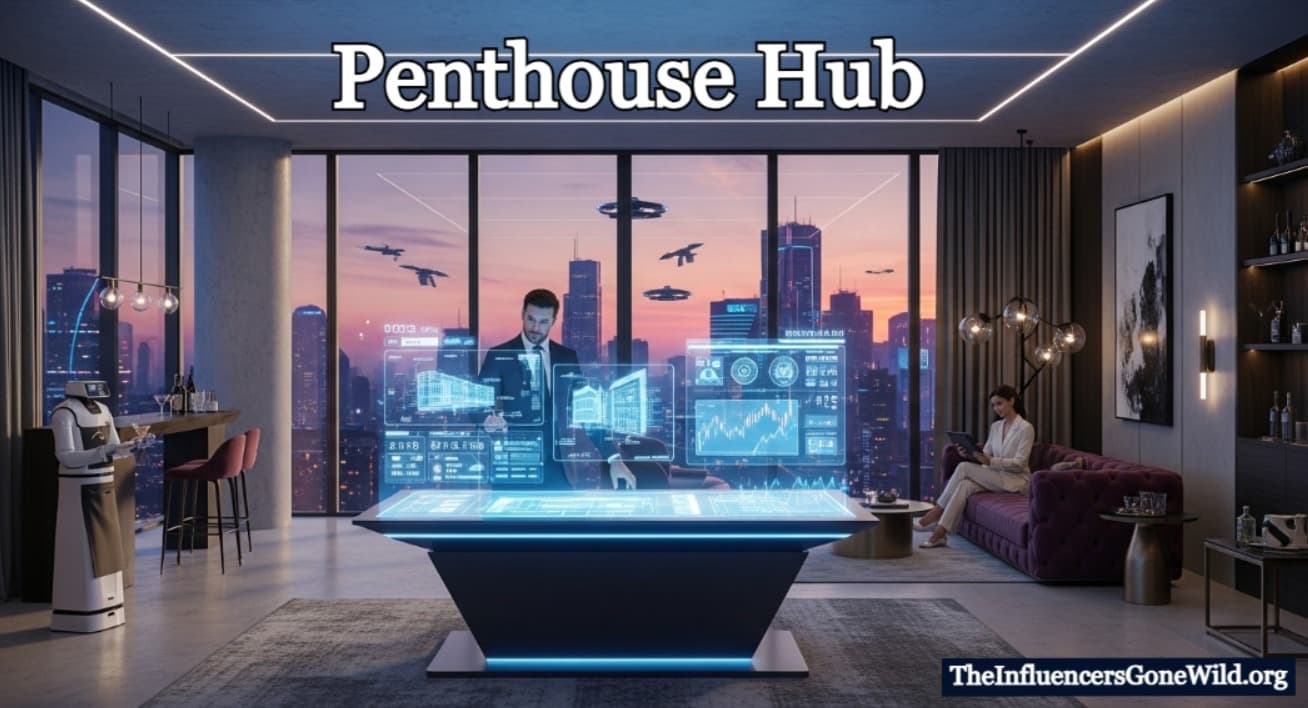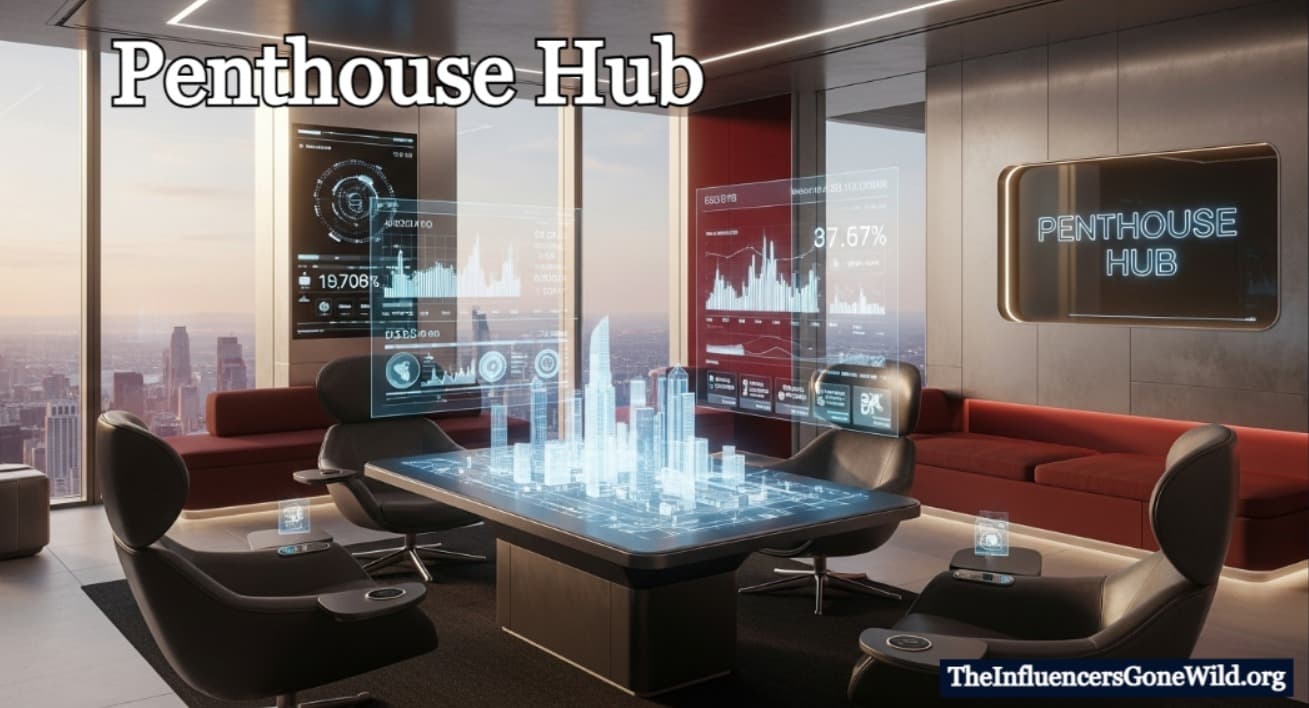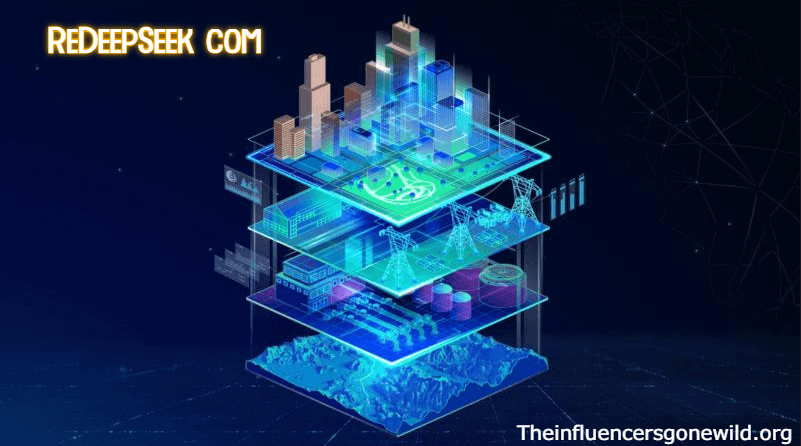Introduction
In today’s urban lifestyle, luxury has taken a digital twist. Enter Penthouse Hub, a term quickly gaining traction among real estate aficionados, interior designers, investors, and digital entrepreneurs. But what exactly is the Penthouse Hub?
Is it just a trendy buzzword or a game-changing concept in real estate and digital lifestyle integration?
This article explores the concept of the Penthouse Hub, diving deep into its origin, features, market impact, and future relevance.
Whether you’re a curious browser, a luxury property investor, or a tech-savvy interior designer, this guide breaks down everything you need to know in a professional yet engaging way.
What is Penthouse Hub?

The term “Penthouse Hub” can refer to two distinct but interconnected ideas:
- A high-tech centralized system or platform integrated within luxury penthouses.
- A digital real estate platform or ecosystem specializing in luxury high-rise living experiences.
At its core, Penthouse Hub blends luxury real estate with smart technology and digital connectivity, making it more than just a place to live—it’s a lifestyle.
The Key Components of a Penthouse Hub
1. Architectural Excellence
Modern penthouse hubs are built atop high-rise buildings, offering panoramic city views, expansive floor plans, and private outdoor terraces.
Common features include:
- Floor-to-ceiling windows
- Open-concept interiors
- Private pools or jacuzzis
- Personal elevators and foyers
- Sustainable, energy-efficient materials
2. Integrated Smart Technology
Technology is the defining trait of any true Penthouse Hub. These spaces are fitted with:
- Smart Home Systems: Control lighting, temperature, security, and media via mobile or voice.
- AI-Driven Living Assistants: Automated home assistants that learn routines and improve energy efficiency.
- Remote Access & Surveillance: Monitor and manage the property from anywhere in the world.
- IoT Integration: Internet of Things allows seamless connectivity among devices—appliances, entertainment systems, and security.
3. Private Amenities
Luxury living is incomplete without access to exclusive, in-house amenities. Penthouses often feature:
- Private gyms and spas
- Infinity pools and rooftop gardens
- Private theaters and gaming lounges
- Wine cellars and cigar rooms
- Chef-grade kitchens with smart appliances
How Penthouse Hub is Transforming the Real Estate Industry
The concept of Penthouse Hub goes beyond luxurious interior design. It’s actively changing how properties are bought, sold, and experienced.
1. Virtual Tours & Digital Walkthroughs
With the help of AR/VR technology, Penthouse Hubs are now being showcased online through:
- 360-degree virtual tours
- 3D modeling of interiors
- Real-time walkthroughs with digital staging
These innovations help international buyers explore properties without stepping foot in them.
2. Blockchain & Smart Contracts
Several platforms associated with the Penthouse Hub ecosystem are using blockchain technology to ensure secure, transparent transactions.
Advantages:
- Faster closing periods
- Reduced fraud risk
- Real-time tracking of title and deed
- Smart contracts to automate purchase agreements
3. Sustainable, Eco-Conscious Design
Modern luxury doesn’t compromise sustainability. Today’s penthouse hubs integrate:
- Solar energy systems
- Rainwater harvesting setups
- Smart HVAC systems
- LEED-certified building materials
These features not only reduce the carbon footprint but also boost property value.
The Target Audience for Penthouse Hub
Understanding who benefits most from the Penthouse Hub concept is essential. Here’s a breakdown:
| Target Audience | Value Offered |
| Luxury Buyers | A unique blend of privacy, comfort, and status |
| Digital Nomads | Smart, connected, and efficient work/life space |
| Investors | High ROI in booming urban real estate markets |
| Tech Enthusiasts | Full integration with latest smart systems |
| Celebrities/Elites | Security, exclusivity, and personal amenities |
Real-World Examples of Penthouse Hubs
One Hyde Park – London
A prime example of a fully equipped penthouse hub, offering private cinemas, bulletproof glass, and biometric security systems.
432 Park Avenue – New York
This iconic tower boasts full-service concierge, dedicated elevators, and climate-controlled wine cellars—all controllable via a central smart hub.
Armani/Casa Residences – Miami
Fuses high fashion and smart tech—each unit features fully integrated home automation, curated interior design, and virtual concierge services.
Expert Insights: What the Industry Is Saying
James K. Wallace, a luxury real estate analyst, states:
“Penthouse hubs are not just luxury spaces; they’re tech-forward investments that cater to the future of work-from-home and lifestyle-centric living.”
Rachel Adams, architect and design consultant, adds:
“The seamless marriage of architecture and technology is what makes the Penthouse Hub a dream living concept for the new generation of elite buyers.”
Penthouse Hub and the Rise of Digital Real Estate Platforms
Digital Marketplaces
Online platforms like property metaverses and tokenized real estate platforms are now beginning to list virtual versions of penthouse hubs.
Key features include:
- NFT-based ownership
- Tokenized fractional ownership
- Virtual penthouse showrooms
These developments position Penthouse Hub as not just a physical location but a digital asset.
Benefits of Investing in Penthouse Hub Properties
- High Resale Value
- Low Supply, High Demand
- Prestige and Exclusivity
- Rental Potential for Elite Clients
- Future-Proof Tech Integration
Challenges and Considerations
Despite their appeal, Penthouse Hubs come with their share of concerns:
- High Entry Costs: Initial purchase and maintenance costs can be substantial.
- Tech Dependence: Over-reliance on smart systems can cause privacy or malfunction issues.
- Maintenance Complexity: Integrated systems require regular updates and skilled technicians.
How to Create Your Own Penthouse Hub
If you’re looking to convert your current penthouse into a high-tech hub, here’s a step-by-step approach:
Step 1: Conduct a Lifestyle Audit
Assess what features would enhance your comfort and productivity.
Step 2: Choose a Smart Home Ecosystem
Brands like Control4, Crestron, or Google Home offer scalable systems.
Step 3: Upgrade Infrastructure
Ensure your space supports:
- High-speed internet
- Backup power supply
- Smart-compatible appliances
Step 4: Consult Professionals
Hire architects and tech consultants experienced in luxury digital living.
The Future of Penthouse Hubs

The future looks promising, with anticipated innovations such as:
- AI-driven environmental controls
- Holographic entertainment systems
- Biometric access points and retina scanning
- Integration with digital twin cities in the metaverse
As demand for smarter, more sustainable luxury grows, the Penthouse Hub will likely become the gold standard.
Conclusion
Absolutely. The Penthouse Hub encapsulates the evolution of luxury real estate, from bricks and mortar to intelligent, experience-driven living spaces.
As technology continues to reshape how we live, work, and connect, Penthouse Hubs are leading the charge.
For property buyers, developers, or design visionaries, understanding and embracing this concept is not just smart—it’s essential for staying ahead in a rapidly changing market.
FAQs
What is a Penthouse Hub?
It refers to a luxury residential unit integrated with smart technology, offering both physical amenities and digital connectivity.
Is investing in a Penthouse Hub worth it?
Yes, it’s a high-value asset with strong resale potential, especially in urban areas with limited inventory.
Can I retrofit an existing penthouse into a Penthouse Hub?
Absolutely. With the right tech infrastructure and design updates, any penthouse can be upgraded.
What smart systems are commonly used in Penthouse Hubs?
Smart lighting, climate control, security systems, AI-based assistants, and IoT-connected appliances.
Are Penthouse Hubs safe from cyber threats?
They are generally secure if protected with updated firewalls, encrypted networks, and cybersecurity protocols.



